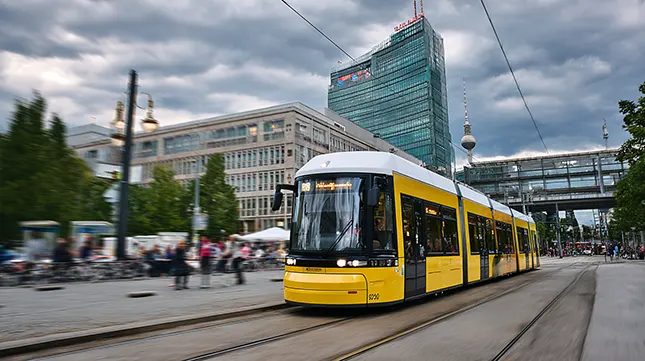Living in Germany – An Ultimate Guide

Thinking of living in Germany but need some more information before you make the move?
Whether it’s the promise of world-class healthcare, a thriving job market, or the allure of a well-ordered life with scenic castles and hearty cuisine, Germany has become a top destination for British expats seeking a fresh start on the continent.
From the vibrant start-up energy of Berlin to the traditional charm of Bavaria and the laid-back northern coast, Germany offers a rich and varied lifestyle to suit all tastes.
However, beyond the culture and career opportunities, it’s essential to understand the practical aspects, such as registering your address, obtaining health insurance, and navigating housing, tax, and visa regulations.
This comprehensive guide walks you through everything you need to know before making the transition from paperwork to public transportation, and all the details in between.
Planning your relocation? Get a free Germany removals quote from White & Company – trusted by UK families since 1871 for a smooth and stress-free European move.
What Makes Germany a Good Place to Live?

Germany offers world-class infrastructure, green energy, and a high standard of living, making it one of Europe’s most attractive destinations for expats.
Thousands of UK expats call Germany home.
Rolling forests, powerhouse industries, and a famously efficient lifestyle mean the Federal Republic has long been more than a stag-do destination.
Post-Brexit, Germans still rank among the UK’s biggest trading partners, and the rail network makes Paris, Prague, or the Alps a weekend hop.
Add first-class healthcare, tuition-free universities, and the country’s green push (47 % of electricity already comes from renewables), and it’s easy to see the attraction.
Whether you crave Berlin’s start-up energy, Bavaria’s beer gardens or the North Sea’s windswept islands, the nine federal cultures guarantee variety.
As we unpack everything a UK national needs to line up before the movers arrive on your drive, you could also be seeking a new life in this incredible country.
Visas, Residence & Registration – Your First Paper Chase

Understanding Germany’s visa and residency process is key — register your address and apply for your residence permit within 90 days of arrival.
First things first, applying for a visa is your very first step.
As a “third-country national,” you can still enter Germany visa-free for up to 90 days; however, anyone planning to work or stay longer requires a residence permit.
Popular routes include the National “D” Visa (applicable in London or Manchester) or direct in-country permits, such as the EU Blue Card for graduates earning € 45,300 or more (lower for STEM fields).
The German Embassy confirms you must register your address (Anmeldung) within two weeks of moving in and request your residence card within the first 90 days – paperwork starts at your local Ausländerbehörde.
See the embassy’s checklist here and GOV-UK guidance here.
Tip: book appointments online well in advance; slots in big cities tend to fill up quickly.
Finding a Home – Renting, Buying & Deposits

Germany’s rental system is tenant-friendly but competitive. Bring your documents to every viewing and understand costs like Kaltmiete and Nebenkosten.
One of the most important steps when relocating to Germany is securing a place to live.
Whether you plan to rent or buy, understanding how the local housing market works will save you time, money, and stress.
From the country’s tenant-friendly rental culture to the formalities of purchasing property, here’s what you need to know.
Germany is a nation of renters (around 50% of households), which keeps tenant rights strong.
Expect three main costs upfront: Kaltmiete (basic rent), Nebenkosten (service charges), and a deposit capped at three months’ rent.
As for cost, in Berlin, a two-bedroom unfurnished flat averages €600–€1,100, while in Munich, the cost can be 15% higher.
Leading portals such as ImmoScout24 let you filter by district and energy label.
Bring proof of salary (three payslips), a Schufa credit print-out (you can order online), and a copy of your passport to every viewing – first impressions matter in competitive markets.
Buying? Non-residents may purchase freely,
foreigners are free to purchase property in Germany, though you’ll need 15%–20% equity to woo German lenders.
Whether for personal use or as a buy-to-let investment, there are no restrictions based on residency, so even non-EU nationals can legally buy a home or apartment.
If you plan to settle in Germany, owning your own property can be a smart long-term investment.
Even if you decide to leave the country later, you can hold onto the property as a rental or sell it when the time is right.
Securing a mortgage is possible as a foreign buyer, although lenders typically require a deposit of 15–20% and may also expect proof of stable income and a good credit history.
Crucially, you don’t have to live in Germany to invest – overseas buyers are welcome.
Find out how far your finances will stretch for a home in the country by visiting popular real estate agents such as Engel & Völkers.
They operate over 1,000 offices in 35 countries.
Realistic Budgeting – Cost of Living Cheat-Sheet

From groceries to utilities, the cost of living in Germany is around 13% lower than in the UK — but varies by region.
Before making the move, it’s wise to get a clear picture of what everyday life in Germany will cost.
While salaries tend to align with the UK, many living expenses are noticeably lower, especially outside the major cities.
Setting a realistic budget will help you settle in with confidence and avoid any unwelcome surprises.
According to Numbeo, a family of four needs about €3,425 per month (excluding rent) to maintain a middle-class UK lifestyle, while a single person’s baseline is around €1,000.
Groceries feel familiar: Lidl, ALDI, and REWE dominate, yet fresh produce can be cheaper if you opt for local markets.
Utilities range from €220 to €300 for a medium-sized flat (with gas costs rising in winter), and public liability insurance (Haftpflicht – highly recommended) starts at around €5 per month.
Also, budget for the mandatory broadcasting tax (Rundfunkbeitrag) of €18.36 and a mobile SIM from €10.
Overall consumer prices are roughly 13% lower than in the UK, but regional gaps are enormous, just as they are in the UK.
Working & Careers – Cracking the German Job Market

Skilled workers in IT, engineering, and healthcare are in high demand. Prepare a concise CV and explore the EU Blue Card route for long-term stay.
If you’re considering a move to Germany for work, the outlook is promising, especially for skilled professionals.
With one of Europe’s strongest economies and a well-organised labour system, Germany offers numerous opportunities, but it also values structure and preparation.
Understanding how the job market works will help you stand out from day one.
Unemployment rates sit near 5%, but shortages in IT, engineering, healthcare, and green technology mean English speakers have solid job prospects.
Start your search on the federal portal Make-it-in-Germany or private employment opportunity boards like StepStone or Stellenanzeigen.
Salaries are quoted grossly/annually; use online tax calculators to estimate take-home pay.
CVs follow a concise two-page format, accompanied by scanned certificates (Zeugnisse) and, ideally, a professional photo.
If you earn above €45,000, you may qualify for the Blue Card, giving you a fast track to permanent residency after 21 months of B1-level German.
Freelancers (“Freiberufler”) must register with the tax office and can apply for a residence permit under the Selbständige Tätigkeit rules.
Take a look at the Robin website for a full explanation about the income tax brackets you will pay on your German salary.
Healthcare & Insurance – Staying Covered

Germany’s public healthcare system is robust and mandatory. Know whether you qualify for public (GKV) or private (PKV) insurance.
Healthcare in Germany is one of the best in Europe – but it’s not optional.
Whether you’re employed, self-employed, or just settling in, you’ll need to make sure you’re adequately insured from the start.
Thankfully, the system is efficient, well-funded, and offers excellent care across the board.
Germany runs a dual healthcare system. Suppose you earn under €73,800 per year. In that case, you’ll automatically be enrolled in the public scheme (Gesetzliche Krankenversicherung or GKV), paying around 14.6% of your income, plus a small surcharge, split equally with your employer.
If you earn above that threshold, are self-employed, or are a civil servant, you can choose private insurance (Private Krankenversicherung or PKV), which can be more affordable when you’re younger, but tends to get expensive as you age.
Top public insurers include Techniker Krankenkasse, AOK and Barmer.
Note: Once you become a resident, your EHIC card will not cover you fully; you will need to obtain proper local insurance.
Additionally, long-term care insurance (Pflegeversicherung) is also required, currently at a rate of around 3.4%.
To make life easier, register with a local Hausarzt (GP) early on. They’ll be your first point of contact and help you access specialists with your electronic health card.
Money Matters – Banking, Taxes & Pensions

Open a local bank account and apply for your tax ID (Steuer-ID) early. Be sure to inform HMRC of your move to avoid double taxation.
Sorting out your finances is a crucial part of settling in, and fortunately, Germany makes it relatively easy once you understand the basics.
From opening a bank account to understanding how taxes and pensions work, here’s what to expect when you land.
Opening a current account is simple, especially with digital banks like N26 or by visiting a traditional branch, such as Sparkasse.
Most banks will ask for your passport and proof of registration (Anmeldung).
If you need to manage money in both euros and pounds, platforms like Wise offer low-fee transfers and multi-currency accounts.
Within a couple of weeks of registering your address, you’ll receive your Steuer-ID (tax ID) by post. It’s an 11-digit number – keep it safe, as an employer can’t pay you without it.
If you’re leaving the UK, submit form P85 to HMRC to avoid being taxed twice – the UK-Germany Double Taxation Agreement takes care of the rest.
UK state pensions can still be paid into your German account, but you’ll need to decide what to do with any private pensions: freeze them, or consider a transfer, depending on your long-term plans.
Education & Childcare – Options from Kita to Uni

Germany offers free public schools, high-quality international schools, and tuition-free universities — but apply for childcare places early.
If you’re moving to Germany with children, you’ll be pleased to know the country takes education seriously – and offers plenty of options at every stage.
From free public schooling to world-class universities and international schools, there’s something to suit every family’s needs and budget.
Germany’s state schools are free and generally of high quality.
Children begin at their local Grundschule (Years 1–4) and then progress to different secondary tracks – Hauptschule, Realschule, or Gymnasium – based on their academic strengths.
Since school places are linked to where you live, your choice of neighbourhood can have a big impact, so it’s worth house-hunting with this in mind.
Would you prefer to keep your child on the British curriculum?
No problem – Germany has over 100 international schools.
Well-known options include Berlin Brandenburg International School, Frankfurt International School, and Leipzig International School, many of which teach the IB Diploma and IGCSEs. Fees can range from €8,000 to €22,000 per year.
For little ones, Kita (preschool childcare) is heavily subsidised, and in places like Berlin, some hours are free after your child turns one.
However, demand is high, so as soon as you have a due date, add your name to the waiting list.
Further information regarding school enrolment for primary to secondary children is available via the Anika website.
As for university? Most are still tuition-free, and many master’s degrees are offered in English, especially at top institutions like TU Munich and RWTH Aachen.
Getting Around – Trains, Autobahns & Driving Licences

Explore Germany with the €58 Deutschlandticket or prepare to swap your UK licence within six months for local driving compliance.
Once you’re ready to explore your local area a little further, getting around in Germany is easy.
With efficient public transport and famously fast roads, it’s easy to stay connected without the stress.
Germany’s train network is one of the best in Europe. For just €58 per month, the Deutschlandticket provides unlimited travel on regional trains, buses, trams, and metros across all 16 states – ideal for daily use or spontaneous trips.
For longer journeys, book ahead on ICE trains where prices start at €17.90 for early-bird fares.
An excellent way to discover the broader region of Germany.
If you’re planning to drive, you’ll need to swap your UK licence for a German Führerschein within six months of registering your address – no theory or practical test required.
Cars must pass a TÜV (like an MOT) every two years, and winter tyres are mandatory between October and Easter.
City centres often have low-emission zones (Umweltzones), so make sure to order a green sticker online before heading in.
Fuel is around €1.85 per litre, but the good news is Germany’s autobahns are toll-free for private vehicles.
Language & Integration – From “Hallo” to Heimat
Moving to Germany is a huge undertaking, so you want to maximise the benefits. Learning the language will elevate your experience to the next level.
While many Germans speak excellent English, especially in big cities and global companies, daily life still runs in German, so getting to grips with the language will make everything easier, from paperwork to making new friends.
Big employers may operate in English, but things like tax forms, healthcare, and school meetings are often conducted in a different language.
That’s why learning German early on is a significant investment.
The Goethe-Institut offers online and in-person courses through its UK branch, covering beginner to advanced levels (A1 to C2).
Once you’re in Germany, you’ll also find low-cost evening classes at local Volkshochschulen (adult education colleges), often for around €120 per semester.
To build confidence, mix study with real-life practice.
Join a Stammtisch (language meet-up), volunteer at a sports club, or try apps like Tandem to chat with locals in a language exchange.
Reaching B1-level German also opens doors: it halves the wait time for permanent residency and is a must for citizenship.
German can be a tricky language, so give yourself time and don’t be afraid to make mistakes.
A Word About Moving Pets to Germany

Bringing your pet? Ensure rabies vaccinations and microchips are up to date and apply for an Animal Health Certificate before travelling.
Bringing your pet along to Germany? Good news, it’s totally doable with a bit of preparation.
If you’re travelling from the UK, your pet (dog, cat, or ferret) will need a microchip, a valid rabies vaccination, and an Animal Health Certificate (AHC) issued by an official vet within 10 days of travel.
You’ll also need to travel using an approved route with an authorised carrier.
Once in Germany, some cities (like Berlin and Munich) require you to register your dog and pay an annual dog tax (Hundesteuer).
Your pet will need pet liability insurance, which is mandatory in certain regions. It’s worth checking with your local Einwohnermeldeamt (registration office) once you arrive.
For the latest rules and updates, visit:
Just make sure you give yourself plenty of time to organise everything beforehand and use a reputable pet carrier company such as Pets2go2 or Pet Transport Services.
Bureaucracy & Everyday Logistics – Your Week One Tick-List

From Anmeldung to setting up mobile service, your first week in Germany is paperwork-heavy — but essential for settling in smoothly.
The first week after moving to Germany can feel like a whirlwind of administrative tasks, but getting the essentials sorted early makes life significantly smoother.
From registering your address to setting up your mobile, here’s a handy to-do list to keep you on track.
- Register your address (Anmeldung) at the local Bürgeramt within 14 days – it’s the key to unlocking almost everything else.
- Open a bank account and share your IBAN with your landlord and employer to receive payments and make rent payments.
- Sign up for health insurance you’ll need a membership certificate as proof of cover.
- Sort your phone plan Telekom’s unlimited data with free EU roaming is a popular option.
- Buy insurance at a minimum, you’ll need Haftpflicht (personal liability) and Hausrat (contents insurance).
- Organise your utilities book your recycling bins and choose an electricity provider. Switching can be quick and save you up to 20%.
- Join a loyalty programme like Payback or DeutschlandCard to start saving on your weekly shop right away.
Being organised is half the battle. Germany rewards preparation: conquer the paperwork, polish a few German phrases, and you’ll uncover a country that balances order with surprising warmth and humour.
Ready to Start Living in Germany?

When time is tight, experience matters most—choose a well-established removals firm that knows how to deliver fast, safe results.
If you’re getting serious about living in Germany, having the right moving company can make all the difference.
At White & Company, we’ve been helping families and individuals move abroad for over 155 years, so we know exactly how to take the stress out of a European move.
From expertly packing your belongings to handling customs paperwork and delivering them door-to-door, our team is here to ensure everything runs smoothly.
Whether you’re heading for a bustling German city or a quiet countryside village, we’ll get your possessions there safely and on time.
If you need to store some of your belongings temporarily until you’re settled, we can help with that too.
Our safe and secure storage facilities are an excellent way to give yourself time to find appropriate accommodation. We can send them when you are ready.
For added peace of mind, we are members of the industry-recognised British Association of Removers (BAR), meaning you have someone to turn to if, in the unlikely event, anything goes wrong.
So, when it’s time to plan your big move, let White & Company take care of the logistics, leaving you to look forward to your new life in Germany!

Max is a seasoned writer and blogger in the real estate and home moving sectors, as well as a knowledgeable source of information for expatriates living and working abroad. His detailed insights have helped thousands of people move and live abroad with greater simplicity and ease.
Posted in: News
Leave a Comment (0) ↓


